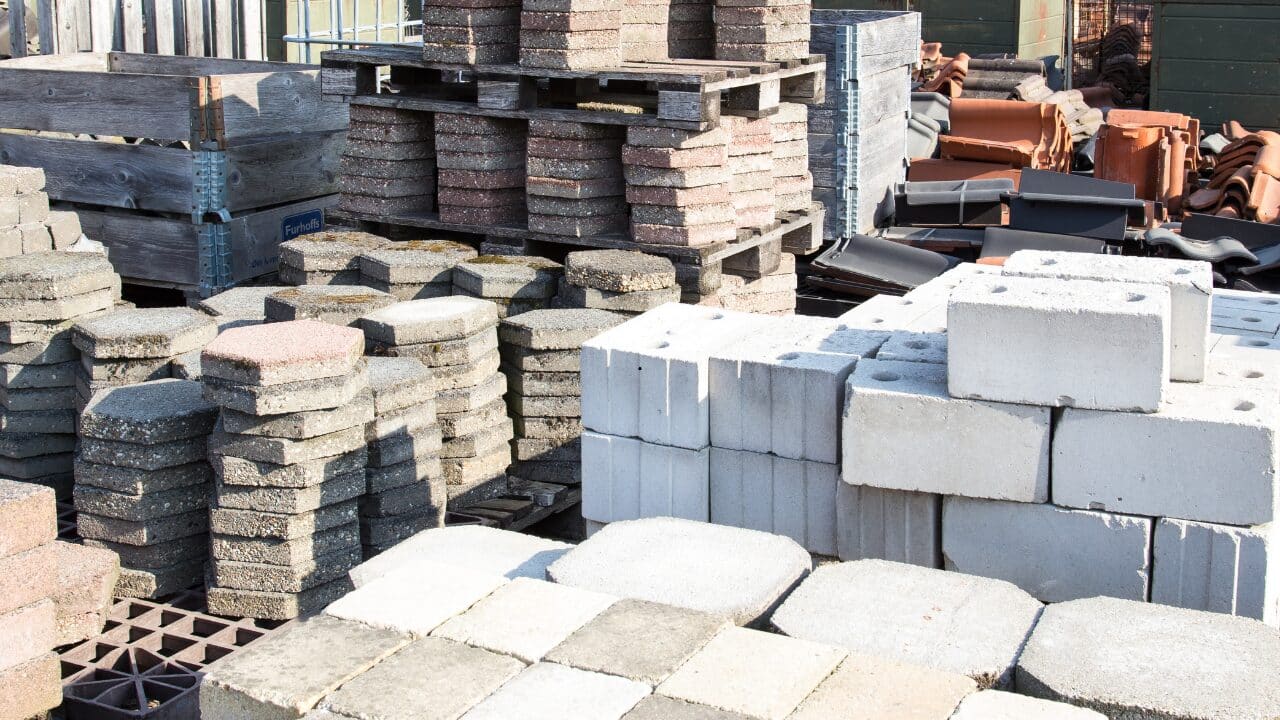The construction and industrial sectors are significant contributors to the UK’s waste stream, making efficient recycling and disposal crucial for environmental sustainability. Both building materials and industrial packaging present unique challenges and opportunities in waste management.
Table of Contents
Building Materials: Recycling and Sustainability
According to DEFRA‘s most recent statistics, the construction, demolition and excavation sector generates the largest waste stream in the UK. The most commonly recycled building materials include:
Concrete and Aggregates
- Can be crushed and reused as aggregate in new construction
- Reduces the need for virgin quarried materials
- Commonly used in road construction and foundations
Metals in Construction
- Steel has a verified recycling rate of 98% in construction (World Steel Association)
- Steel can be recycled repeatedly without losing quality
- Aluminium maintains its properties through infinite recycling cycles
Timber and Wood Products
- Clean timber can be recycled into chipboard or biomass fuel
- Treated wood requires specialist recycling
- Wood recycling contributes to carbon reduction targets
Industrial Packaging Materials
The recyclability of industrial packaging varies by material type:
Plastic Containers
- HDPE drums and IBCs are recyclable when properly cleaned
- Professional cleaning extends recyclability
- Must be free from hazardous residues for recycling
Metal Packaging
- Steel drums can be recycled indefinitely
- Reconditioning extends useful life
- Achieves high recycling rates when properly processed
When handling industrial packaging disposal and recycling, it’s essential to work with licensed operators who understand regulatory requirements. Several companies across the UK offer specialist services for cleaning, reconditioning, and recycling industrial containers. For example, services are available at https://prdservices.co.uk/ for both hazardous and non-hazardous packaging disposal, ensuring compliance with current waste management regulations.
Most Eco-Friendly Materials
Building Materials:
1. Recycled Steel
- Requires significantly less energy than virgin steel production
- Maintains structural integrity through recycling
- Widely available in construction supply chains
2. Recycled Aggregates
- Reduces quarrying impact
- Meets construction standards when properly processed
- Widely accepted in construction projects
3. Engineered Wood
- Carbon storage capabilities when sourced sustainably
- Reduces concrete usage
- Provides good thermal performance
Here’s 5 waste management tips for your construction business.
Industrial Packaging:
1. Steel Containers
- Proven infinite recycling potential
- Suitable for reconditioning and reuse
- Established recycling infrastructure
2. Recyclable Plastics
- Multiple recycling cycles possible
- Established recycling processes
- Wide availability of recycling facilities
Processing and Disposal
Both sectors require specialist handling:
Building Materials:
- Material-specific sorting requirements
- Processing through licensed facilities
- Quality testing for reuse applications
Industrial Packaging:
- Decontamination where necessary
- Material separation
- Professional disposal through licensed operators
Environmental Benefits
Verified benefits of effective recycling include:
- Reduction in landfill usage
- Conservation of virgin materials
- Lower transport impacts when using local recycling facilities
- Compliance with waste regulations
Best Practice Guidelines
For optimal recycling outcomes:
1. Material Selection
- Choose materials with established recycling routes
- Consider end-of-life disposal options
- Follow industry standards for material specification
2. Waste Management
- Implement clear waste segregation
- Use licensed waste carriers
- Maintain waste transfer documentation
3. Compliance
- Follow Environment Agency guidelines
- Keep accurate waste transfer records
- Work with licensed facilities
Future Focus
Both sectors are developing:
- Improved sorting technologies
- Enhanced recycling processes
- Digital waste tracking systems
- Greater focus on circular economy principles
The successful recycling of building materials and industrial packaging requires adherence to established protocols and regulations. By following industry best practices and working with licensed operators, organisations can effectively manage their waste while meeting environmental obligations.
This guide provides general information based on current industry standards. For specific requirements and up-to-date regulations, consult the Environment Agency or licensed waste management professionals.





